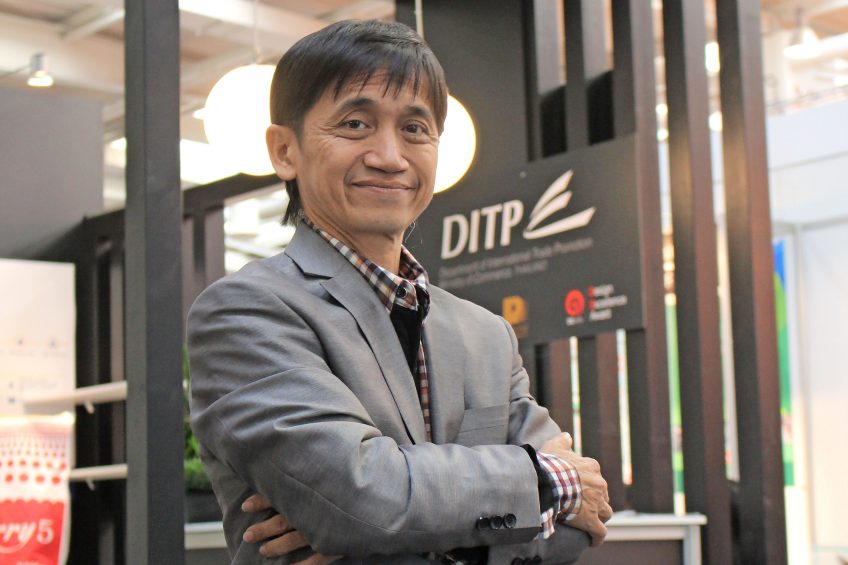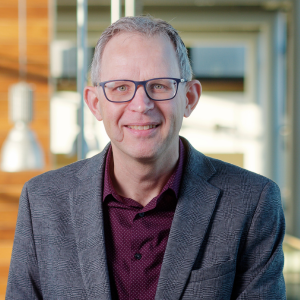From cars to livestock in one career

If back in the 1990s, Jumrat Parnpiansil would have been asked about his future career, no doubt he would have said it would be the automotive industry. Yet in 2017 he is a prominent player in Thailand’s livestock equipment sector – and has been for many years.
Who knows what could have happened if Jumrat Parnpiansil would have had other things to do in March 2001? He chose, however, to attend trade show VIV Asia 2001, held at that time at the Queen Sirikit National Convention Center in Bangkok. Quite frankly, he had never heard of the show and the livestock business was something completely new to him: he happened to visit the show by accident. As an industrial engineer, however, he immediately took an interest in the poultry slaughtering equipment on display – and was impressed when he heard about the amount of business going in slaughter lines.
As an engineer, he had spent his days mostly in the car business. At the time, he owned a company preparing autoparts as a subcontractor for car brands. Toyota, Honda, you name it – it was all available in Thailand in the heyday of the 90s. However, when the South East Asian crisis came in 1997 and after, little of that remained. What had once been a flourishing industry with 30,000 cars produced per month, withered away to about 1,000 every month. Thousands were left searching for new jobs.
Agriculture as new vocation
Jumrat was one of them. He found his new vocation, that March day in 2001 at the Bangkok convention centre, and as a result decided to start designing his own line of slaughter equipment. Speaking to Poultry World, he says, “Most shackles at that time present in the industry could either deal with larger or smaller birds, but not with both. This could be done better, I thought. I set out to design something that would be applicable for both smaller and larger birds, one that could change size.”
Once he had designed this type of shackles, he then focused on having an entire slaughter line designed, including a conveyor and equipment. About a year into the business, and having acquired various customers as well as quality assurance registrations, Jumrat had another decisive moment in his career. He started to realise that his daily ritual being a good Buddhist was difficult to reconcile with working in a business that revolves around slaughtering animals. “I just didn’t feel happy,” he says.
That made him shift his emphasis onto the phase prior to the slaughterline – animal husbandry, predominantly pigs and poultry. His company JRL Agrinnovate has been focusing ever since on producing and selling quality farm equipment. The company, headquartered in Samut Prakan, very close to Bangkok, grew to be a successful business of roughly 40 people. JRL exports to other South East Asian countries like e.g. Vietnam, the Philippines and Indonesia.
Water solutions
The portfolio of livestock equipment is wide. A vast part of the products revolve around the use of water on-farm, as water use in tropical countries is a different ballgame than in the rest of the world. The portfolio includes e.g. filters, chlorine injectors, vaccination pumps and watering systems. “Take for instance these drinking nipples for large broilers or ducks,” Jumrat says, holding an example in his hand, “on average the availability of European-made nipples for a long time used to be around 70 cc/minute indoor. The trouble of the nipple is that, that may not be enough water for birds in Thailand. If they don’t get enough water, then they are dead. So I chose to maximise the volume to 200 cc/minute.” Other companies have also started introducing something similar, he adds. “We’ve been doing that for the last 16 years already.”
His key message: as a Thai company JRL Agrinnovate sells solutions predominantly aimed at farms in tropical climates. At international shows, his aim is to get in touch with farmers in similar conditions all over the world – the European or North American markets are not as interesting to him. However, seeing that the entire world meets at shows like VIV Europe or EuroTier, that is where he chooses to be as well. It is a habit he has had for many years.
Thai Livestock Equipment Association
In whatever business Jumrat was active, he has always believed in the strength of cooperation, that is why he was involved in the foundation of various associations, he tells. He was also one of the founders of the Thai Livestock Equipment Association (TLEA), a non-profit organisation for Thailand’s livestock equipment producers. Main idea: as new companies sometimes come and go, it is not always easy to understand which ones can be considered reliable and trustworthy in the market.
Set up about five years ago, the TLEA has grown out to become an organisation including 28 enterprises throughout the country, with support of Charoen Pokphand and Betagro. Most members are headquartered around Bangkok and all focus on the manufacturing of equipment for livestock, be it poultry, pigs or dairy cows. Members are specialised in a wide range of topics, from silos to feeding equipment, from sow housing to waste management and – of course – climate control systems and evaporative cooling.
“The association has a couple of missions,” explains Jumrat, who was elected TLEA president two years ago. The first mission is being a certification body. He says, “Thailand did not have any certification standards for equipment. This standardisation of farming equipment is coordinated with the Ministry of Industry.”
The second, related to the first, is to provide trust with customers. Jumrat explains, “If a business is in the TLEA, this means that you can trust them. You are guaranteed the money is well-spent.”
A third goal is to facilitate and coordinate efforts for Thai companies during (international) trade shows, like e.g. EuroTier or VIV Asia. As such the TLEA was present at EuroTier 2016 in Hanover, Germany and also is it the driving force behind the Thai Pavilion at the upcoming VIV Asia 2017, where at least 13 Thai exhibitors can be found.

Biography
Jumrat Parnpiansil, age 56, is a civil industrial engineer from Samut Prakan, Thailand, and owner of Agrinnovate Company. Under the brand name JRL farm equipment, he manufactures and sells equipment for pig and poultry farms. He got his degree from Khon Kaen University in the north east of the country, before initially becoming a subcontractor in the car manufacturing business. Currently, JRL company has about 40 employees. Jumrat has also been president for the Thai Livestock Equipment Association (TLEA) for the last two years.
Future
It is difficult to predict what the imminent future will bring for the development of Thailand’s livestock equipment business, Jumrat says. Volatility and price fluctuations characterise Thailand’s industry, with situations of oversupply followed by undersupply.
Much will depend on the development of the world economy, he adds. He hopes that his company can bit by bit shift a larger part of his revenues from abroad. For the moment, predominantly the countries in the ASEAN region have his priority. That doesn’t include Myanmar yet, he adds, although the country has been going through reform. “A lot of merchandise is being paid for by cash,” Jumrat says. “For international business, we do not use cash. Myanmar, however, is yet to develop a banking system that matches Thai requirements for money transfer.”
VIV Asia 2017
From being an accidental visitor, 16 years ago, Jumrat Parnpiansil has become a ‘regular’ at VIV Asia. He shall be back at the BITEC showgrounds in March, when the 2017 edition of the show opens its doors. At the booth of JRL (H099.2249) and at the booth of his subsidiary JRL Agrinnovate in the Thai pavilion, no doubt he will proudly talk all about new innovations, like a forced-air gas heater, an intelligent doser and a self-checking watering system.








